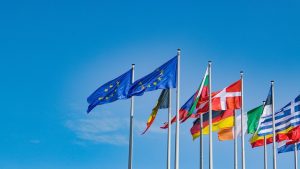
A new framework for digital services
The new framework under the DSA will rebalance the rights and responsibilities of users, online intermediaries, including online platforms. In addition to very large online platforms, and public authorities.
The DSA contains EU-wide obligations that will apply to all digital services that connect consumers to goods, services, or content. This includes new procedures for faster removal of illegal content as well as comprehensive protection for users’ fundamental rights online.

According to Simon Elliott, Senior Technical Director, Acquia “The legislation laid out in the Digital Services Act is a significant step towards restoring some of the original principles of the web. It also underpins the critical need for an ongoing re-evaluation of the rules that govern our digital ecosystems.
“The misuse of consumer data and rampant spread of online misinformation has turned public sentiment against big tech companies and social media platforms. This can only lead to an erosion of trust. Scrutiny of technology platforms’ role in fuelling misinformation has been on the agenda of regulators for a long time. Furthermore, the use of social media platforms to spread fake news around the ongoing crisis in Ukraine has emphasised the need for more robust controls on the spread of illegal and harmful content,” Elliott adds.
In the scope of the DSA are various online intermediary services. Their legal obligations under the DSA depend on their role, size, and impact on the online ecosystem. These online intermediary services include:
- Intermediary services offering network infrastructure: Internet access providers, domain name registrars.
- Hosting services such as cloud computing and web hosting services.
- Very large online search engines with more than 10% of the 450 million consumers in the EU. The commission believes these companies have more responsibility in curbing illegal content online.
- Online platforms bringing together sellers and consumers such as online marketplaces, app stores, collaborative economy platforms and social media platforms.
- Very large online platforms, with a reach of more than 10% of the 450 million consumers in the EU. Such platforms could pose particular risks in the dissemination of illegal content and societal harms.
The DSA key features
Measures to counter illegal goods, services or content online, such as:
- A mechanism for users to easily flag such content and for platforms to cooperate with so-called ‘trusted flaggers’.
– New obligations on traceability of business users in online market places; - New measures to empower users and civil society, including:
– The possibility to challenge platforms’ content moderation decisions and seek redress. Either via an out-of-court dispute mechanism or judicial redress;
– Provision of access to vetted researchers to the key data of the largest platforms. Provision of access to NGOs as regards access to public data, to provide more insight into how online risks evolve.
– Transparency measures for online platforms on a variety of issues. This includes on the algorithms used for recommending content or products to users. - Measures to assess and mitigate risks, such as:
– Obligations for very large platforms and very large online search engines to take risk-based action to prevent the misuse of their systems and undergo independent audits of their risk management systems;
– Mechanisms to adapt swiftly and efficiently in reaction to crises affecting public security or public health;
– New safeguards for the protection of minors and limits on the use of sensitive personal data for targeted advertising. - Enhanced supervision and enforcement by the Commission when it comes to very large online platforms. The supervisory and enforcement framework also confirms important role for the independent Digital Services Coordinators and Board for Digital Services.
Ambeshwar Nath, SVP & Industry Head (EMEA) – Consumer Goods, Retail & Logistics, Infosys says, “Following GDPR, Digital Services Act is the next watershed moment of EU legislation. It provides the long-awaited checks and balances on big technology companies who handle some of our most intimate data. The legislation will inspire more consumer confidence in the services and operations of digital companies. It should also ensure ethical innovation and business practices which all technology companies have a responsibility to provide.”
Next Steps

European Commission President Ursula von der Leyen said, “The agreement on the Digital Services Act is historic. Both in terms of speed and of substance. The DSA will upgrade the ground-rules for all online services in the EU. It will ensure that the online environment remains a safe space, safeguarding freedom of expression and opportunities for digital businesses. It gives practical effect to the principle that what is illegal offline, should be illegal online. The greater the size, the greater the responsibilities of online platforms. The agreement – complementing the political agreement on the Digital Markets Act last month – sends a strong signal. To all Europeans, to all EU businesses, and to our international counterparts.”

Nath adds, “In simple terms, it is aimed at establishing digital regulation that will make digital channels safer. Furthermore, hold large platform companies accountable for illegal content, disinformation and unsafe or counterfeit sales. New provisions will ensure the legality of products on marketplaces. It allows consumers to seek compensation for non-compliance will add an extra layer of trust and empower today’s consumers. Some have all too often fall victim to fraudulent online practices, as they navigate the online channels.”
The agreement reached by the European Parliament and the Council is now subject to formal approval by the two co-legislators. Once adopted, the DSA will be directly applicable across the EU and apply fifteen months or from 1 January 2024. Regarding the very large online platforms and very large online search engines the DSA will apply from an earlier date, that is four months after their designation.
Clear, harmonised obligation for big tech companies
The political agreement on the DSA reached by co-legislators is a landmark moment in the history of Internet regulation. It includes new rules that will require Big Tech platforms – including Facebook and Instagram (owned by Meta). YouTube (owned by Google) – to assess and manage systemic risks posed by their services. This includes advocacy of hatred and the spread of disinformation. For the first time, these companies will also need to submit to independent yearly audits, and to give regulators and third-party researchers, including civil society, access to platform data and insights into their algorithmic ‘black boxes’ to ensure greater scrutiny and accountability.
The DSA is setting clear, harmonised obligations for platforms – proportionate to size, impact and risk. It entrusts the Commission with supervising very large platforms. It includes the possibility to impose effective and dissuasive sanctions of up to 6% of global turnover. There’s even the possibility of a ban on operating in the EU single market in case of repeated serious breaches. EU institutions have worked hand in hand in record time, with determination and ambition to protect its citizens online. Is the time of big online platforms behaving like they are “too big to care” is coming to an end?

























